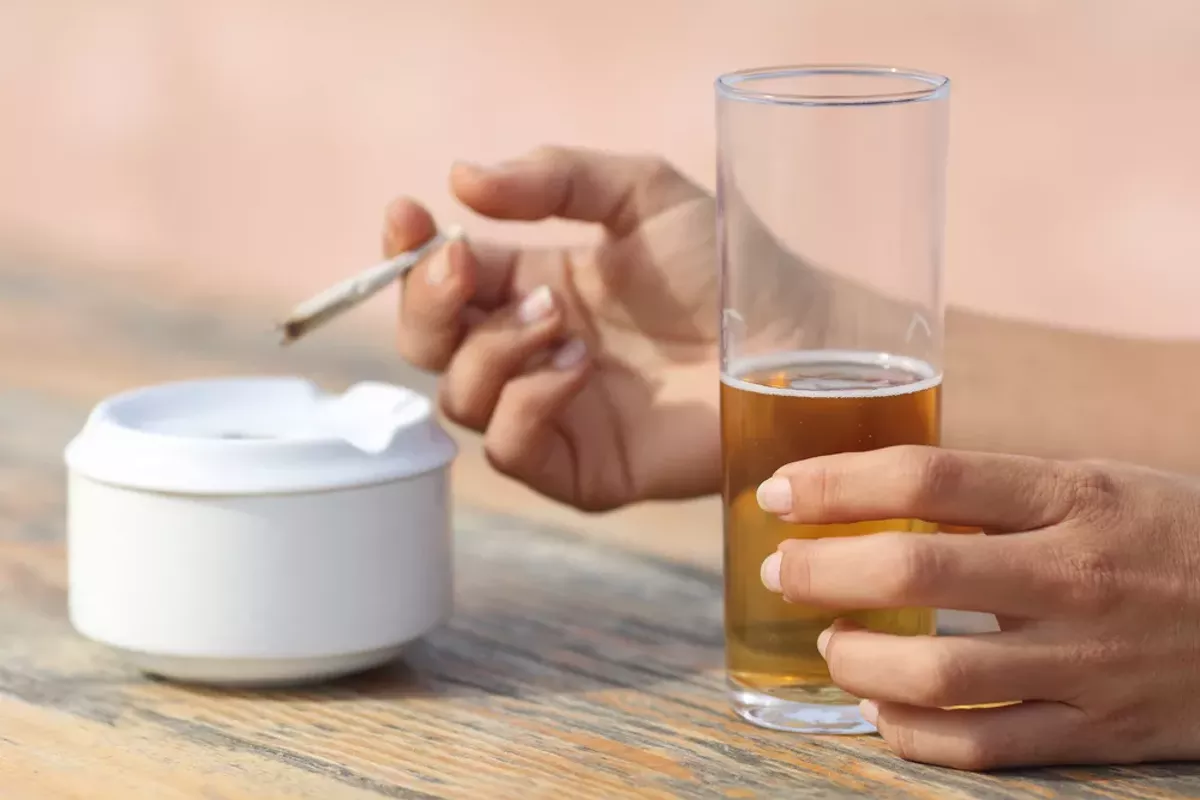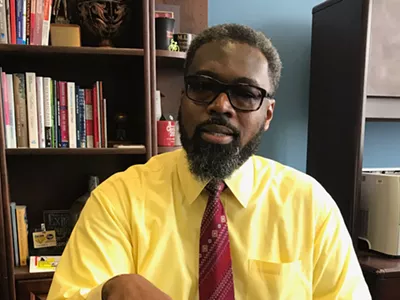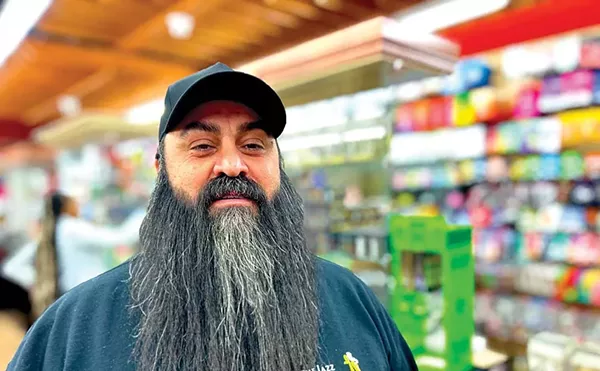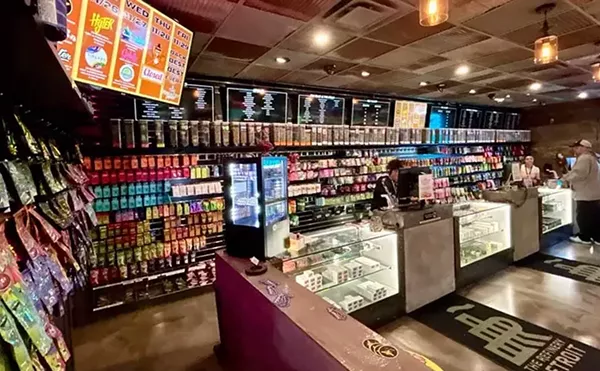

Audio By Carbonatix
[
{
"name": "GPT - Leaderboard - Inline - Content",
"component": "35519556",
"insertPoint": "5th",
"startingPoint": "3",
"requiredCountToDisplay": "3",
"maxInsertions": 100,
"adList": [
{
"adPreset": "LeaderboardInline"
}
]
}
]
I watched a short clip of Will Jones giving a keynote speech at a Healthy and Productive Michigan event held recently at Wayne County Community College District. His argument against marijuana is that we already have two dangerous drugs that are legal — why add a third? "Two is enough," he said in fingering alcohol and tobacco as the culprits.
He's got it right about alcohol and tobacco — they are dangerous, although I think that caffeine and refined sugar should be added to the list. And I don't expunge red meat as a possible dangerous substance, but I'm not going there today.
Do you know anybody who can't even be civil in the morning until they've had two or three cups of coffee, or cigarettes? That sounds like someone with a jones to me. Do they load up their coffee with sugar? Have you ever watched a bunch of kids eat candy and sugar treats and then spin into uncontrolled mayhem? We laugh that off as a sugar high.
Coffee holds a hallowed place. At almost every workplace there is a little shrine where coffee sits, hot and ready to quaff. If somebody empties the pot and doesn't brew a new one, they face censure.
Coffee has not always held the hallowed place that it now holds in the world of business. In 17th century England, when coffee first arrived from Turkey, coffee shops quickly became popular as a gathering place to charge up and chat. In 1675 King Charles II banned them in England because, among other things, he claimed that coffeehouses disturbed the peace and promoted idleness. Apparently during this era political malcontents gathered at coffee houses to talk bad about the king.
It seems that Richard Nixon followed that same tactic in the course of having marijuana categorized as a Schedule 1 drug. It has been documented that he did it specifically because it was associated with minorities and hippies, who were part of his political opposition. Just in case you think he was right to do this, it was in direct contradiction of his own Shafer Commission that recommended that it be legalized. But I digress — let's get back to Mr. Jones and his lame argument against marijuana.
What I'm getting at here is that what's legal and illegal can be a matter of when and where you are, who's in charge, and what their concerns are.
It's interesting that Jones' "two is enough" approach doesn't condemn marijuana, it just says that we have enough stuff to adjust our moods with and we don't need to add marijuana. In the video, his argument seems to hang heavily on the idea of saving black neighborhoods from the ravages of vice, something a lot of folks around here would say amen to.
But what if I don't want tobacco or alcohol? What if I want something that doesn't cause cancer, heart disease, emphysema, cirrhosis of the liver, or severe physical addiction? Do I have to be punished by the very substances themselves?
Last time I looked, marijuana didn't cause any of those diseases, and is even useful in treating some of them. The National Institutes of Health says cannabinoids have anti-cancer effects.
What I'm getting at here is that what's legal and illegal can be a matter of when and where you are, who's in charge, and what their concerns are.
tweet this
In his "two is enough" world, Jones favors alcohol and tobacco against their fairer sister cannabis. Well sure, marijuana isn't for everybody. Some people should just leave it alone. The same thing goes for alcohol; if you can't handle it, leave it alone. For that matter, the same thing goes for sex. If you can't handle it, leave it alone.
In the next few months we're going to hear a lot about marijuana from both sides of the legalization argument. Healthy and Productive Michigan, the main anti-marijuana organization fighting the legalization initiative, has already been out there spreading half-truths and fear.
Jones argues that people don't want marijuana concentrated in black communities the way liquor stores have proliferated. There's truth to that. That's what happened in Detroit when medical marijuana was legalized, while Oakland County refused to allow retail sales outlets. Now there's a movement among Detroiters to ban marijuana stores from Seven Mile Road to Eight Mile Road. We'll see how that works out. However, it seems the majority of Detroiters, who have voted pro-marijuana every chance they get, are OK with some form of retail presence.
The Two is Enough campaign had its origins in the attempt to derail legalization in Washington, D.C. in 2014. It failed, and recreational legalization won.
Jones, who has been making Michigan appearances, leans toward the conspiratorial view that marijuana legalization is some sort of trick against the black community. The real trick against the black community is prohibition. Marijuana laws have been used to hang convictions on black people that dog them for life, and restrict access to education and housing funds. It gives police the excuse to hound people, break into their homes, break up families, and create crippled communities.
And, as stated earlier, the whole War on Drugs was concocted as a way for the Nixon administration to fight its political enemies. There are so many downsides to prohibition that I don't see any way that legalizing marijuana, which is already pretty much everywhere, will hurt things.
When it comes to harming the community, two is too many if those two are tobacco and alcohol. When it comes to harming the community, prohibition has been a scourge on poor people, black people, and Latino communities.
I would recommend that Jones's appeal should be "four is enough" and target tobacco, alcohol, coffee, and sugar. For most people, marijuana is healthier than all of those substances.
Legalizing marijuana would bring more peace to the community. Then Mr. Jones can hold his two fingers up in a peace sign. That's a winner.
Sex toys and oils?
New Jersey lawmaker Ronald Rice, a Democrat, has a warning against legalization that ranks up there with the worst of them. "If in fact we legalize recreational marijuana, right across the street from my office they're going to put up stores," he recently told NJTV. "They want to call them dispensaries, but they're going to be stores that do retail selling cupcakes with marijuana, candies with marijuana, sex toys and oils with marijuana, lipsticks with marijuana, all those kinds of products that kids can get and people can get."
As far as mixing sex toys with marijuana, well, people do get creative at times. As far as kids getting it, that will be illegal. As far as people getting it, I think that is the idea.
Taking care of business
Michigan finally bestowed the first licenses to seven marijuana businesses — one dispensary, one processor, one transporter, and four grow operations — a year and a half after the law allowing them was passed. None of them are in Detroit; the closest one to the Motor City is in Ann Arbor. While all medical marijuana must be tested for purity, none of the licenses went to a testing facility — which could be a hang-up in actually getting these places going. Hopefully now that licenses are beginning to be given out, the clog in the system has been cleared and we'll see more movement soon.
In another move, the state approved 11 new qualifying conditions for medical marijuana certification — arthritis, autism, chronic pain, colitis, inflammatory bowel disease, obsessive compulsive disorder, Parkinson's disease, rheumatoid arthritis, spinal cord injury, Tourette's syndrome, and ulcerative colitis. There are two big surprises in that list. One is autism, which had been previously rejected. The other is chronic pain. Formerly the condition was severe chronic pain. Now it just has to be pain.
The board rejected anxiety, asthma, brain injury, depression, diabetes, gastric ulcer, non-severe or non-chronic pain, organ transplant, panic attacks, schizophrenia, and social anxiety disorder as qualifying conditions.
Stay on top of Detroit news and views. Sign up for our weekly issue newsletter delivered each Wednesday.





